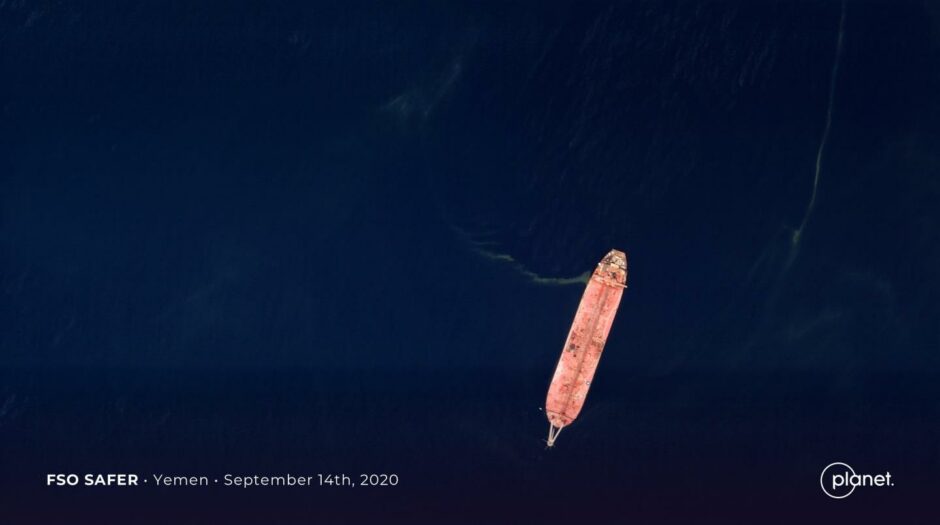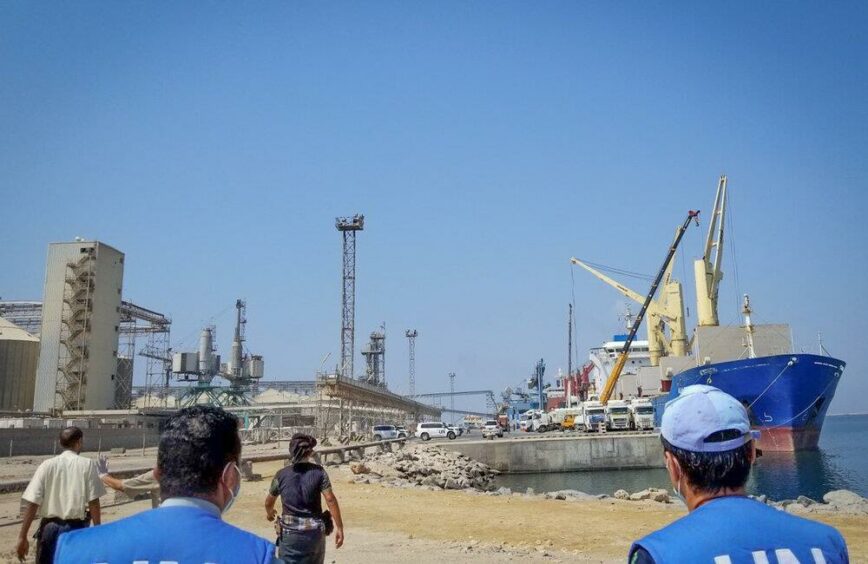
The FSO Safer poses both a local environmental threat but also a major pitfall for shipping through the critical Red Sea and Suez Canal.
Yemen moored the storage vessel offshore in 1988. As a result of the Yemeni conflict, there has been no maintenance since early 2015. The ailing ship holds around 1 million barrels of crude.
“Unless all of us move fast, it will be a major global catastrophe,” Venediktos Roussos of Polygreen’s Maritime Division told Energy Voice.
An oil spill in the Red Sea would disrupt shipping, Roussos said. “The global economy suffers and we would all suffer.”
The Polygreen executive highlighted the impact of the Ever Given, when it severed the Suez Canal supply route for six days. “A two or three month stoppage would be a major problem for the whole world. Every single person on the planet should be concerned.”
Riskaware’s Simon Agass also warned of a “significant impact”. Riskaware has carried out an analysis of the FSO Safer. “This needs to be considered as a potential global catastrophe.”
Local to global
Agass said local conditions, such as meteorology, currents and the sea state would have an impact on how bad a problem might be.
The amount of oil on the FSO is four times higher than the Exxon Valdez. Riskaware has said a spill could take 25 years to recover from and at a cost of up to $20 billion. Pollution could reach as far as the Bab-el-Mandeb strait, with some oil reaching the Gulf of Aden.
The local impact would see 63,000 fishermen lose their livelihoods. The Al Hodeida port would close for five to six months, driving up local fuel prices and disrupting services.
A fire would have a similarly terrible impact. Fire on the FSO would cover around 40% of Yemen in soot, driving more than 3 million farmers out of their jobs for at least a year. Air pollution and water contamination would put more strain on the country’s already over stretched health system.

“In the worse case scenario, a disaster would occur between April to June,” Agass said, noting the impact on local livelihoods. Echoing Roussos’ point, Agass noted that oil slicks would deter shipping.
“This is not just a regional or local problem. There is an environmental and socioeconomic impact, locally, but there’s also a global problem. If oil pollution gets to Bab-el-Mandeb then it would have an impact on trade routes,” Agass said. “Air pollution would also have a knock-on impact, on Yemen’s neighbours and beyond.”
Dead ship
The United Nations, and other bodies, have tried at various times to inspect the FSO in an attempt to gauge the extent of the problem. They have not been successful.
The UN Security Council held a hearing on the FSO Safer in June 2021. Yemen’s representative to the UN, Abdullah Ali Fadhel al-Saadi, blamed the lack of progress on the Houthi militias, which control the port close to the FSO.
Al-Saadi said the militias were using the environmental threat as a “bargaining chip”. He called for the UN to do more.
“The tanker has just been left to its own devices. It’s considered a dead ship, there are no active systems on the vessel. It’s just been left to float there, a huge risk in the middle of a warzone,” Agass continued.
The time has come, Agass and Roussos said, where maintenance alone could not resolve the problem. The first step would be to extract the oil, followed by the decommissioning of the FSO.
“There’s only one solution to avert this problem. It must be dealt with in its entirety. Remove the cargo and tow the ship away for green recycling, this is the only way to solve it,” Roussos said.
An operation to remove the oil and the ship would carry with it risks, Agass said. “There are risks of oil in the water. The longer this goes on, the more it becomes corroded and fragile.”
Polygreen could carry out this work, Roussos said. “We have the resources and have studied the problem. But the important thing is that someone does it.” He estimated that work to avert a crisis would take three to four months, although the process of disposing of the ship would take longer.
Leaks
There have been some claims recently of leaks. An official in the local governorate reported that the pipeline from the leak to the tanks was leaking, saying a disaster would happen.
There is some uncertainty about whether a leak has actually occurred. Satellite imagery did not appear to show a leak.
“It can be difficult to pinpoint the truth. We couldn’t see any obvious signs but without inspectors onboard it’s very hard to tell. Proper surveys are needed to determine what is going on,” Agass said.
Should a leak occur, an emergency response would be complicated by the local politics. “If you’re not allowed to board the ship, how can you clean it up?” asked Roussos.
Polygreen has been involved in responding to the Wakashio spill. Around 1,000 tonnes of oil leaked into the ocean in mid-2020. “We are still dealing with the spill in Mauritius, that’s a big problem,” he said.
A spill from the FSO Safer would likely be worse, both for the local environment and global trade.

 © Supplied by UN Photo/UNMHA.
© Supplied by UN Photo/UNMHA.